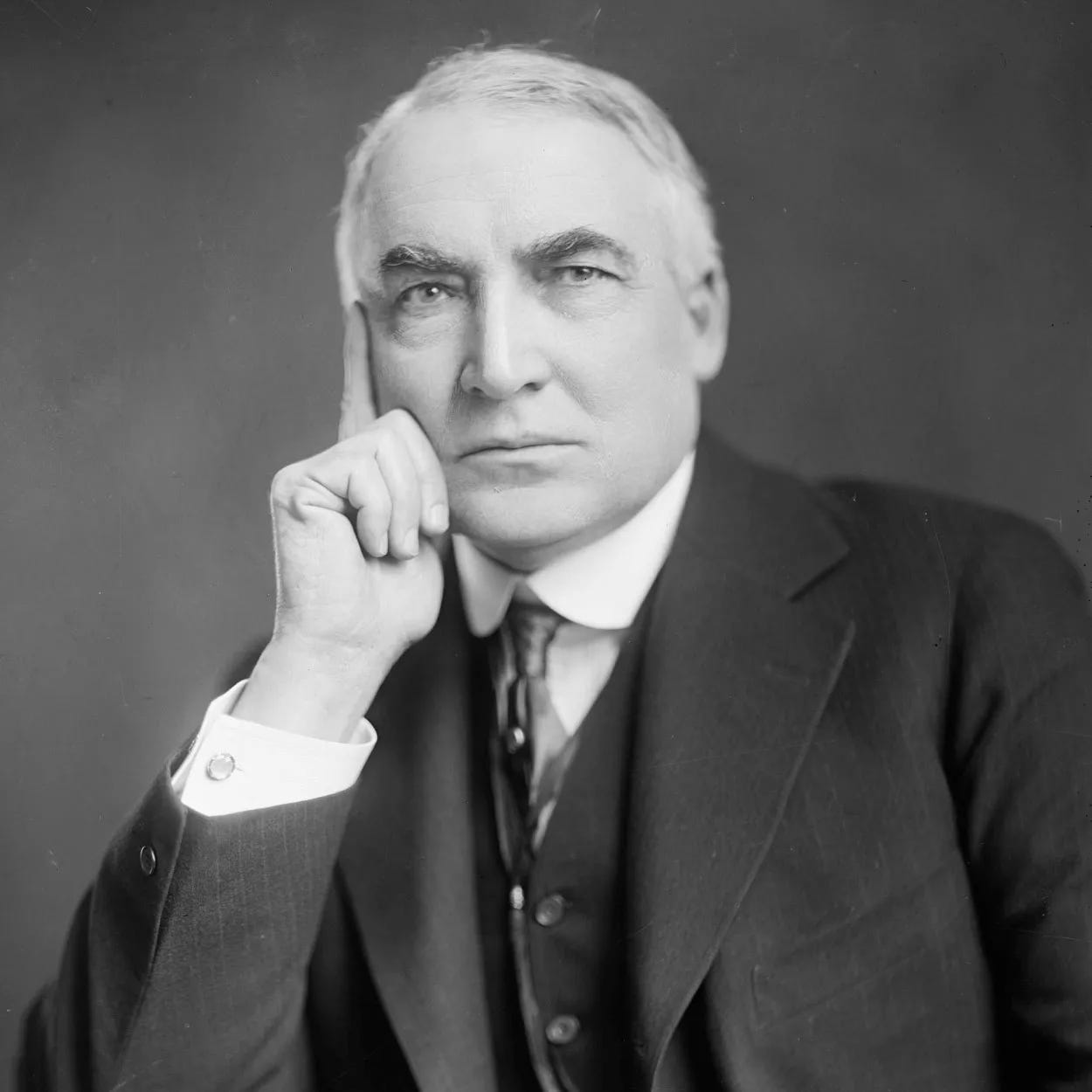August 2, 1923, 7:20 p.m.
The president's heart beats laboriously. Enlarged, it contracts and wheezes like a heavy man walking uphill. For days now, weeks perhaps, as the president has toured the Western U.S. on his "Voyage of Understanding," blood clots have been scudding through his veins and entering his heart, causing small heart attacks. His doctors call them "gastrointestinal attacks" or "apoplexy." They think perhaps he was food poisoned. They think he is working too hard.
Now he sits up in his bed at the Palace Hotel in San Francisco. His wife is reading him an article from The Saturday Evening Post. The article is about him. It's called "A Calm Review of a Calm Man." The president likes what it says.
"That's good," he says when Florence finishes a passage. "Go on, read some more." Just at this point, the final clot tumbles through his vena cava and enters the right atrium of his heart. At this final indignity, the overburdened heart has no more ability to cope. Its electrical impulses go wild. The president pitches to one side.
Hello there, Warren Gamaliel Harding.
Who are you?
You know me, Warren. I'm the pain in your gut that keeps you pacing the floor at 3 a.m. I'm the darker spot in the darkness that threatens to swallow you whole. I'm that crick in your neck that won't stop. That sinking feeling when you look at your wife. That heaviness in your heart that thuds in your ears.
Why are you here? What's happening? That sinking feeling . . .
This is the moment. This is the final few seconds. It's time to review your record, Warren Gamaliel.
My record . . . my record is good. Did you not hear the article my wife was just reading? My record is good.
Is it though? Or is it rather the best that a calm man was capable of, a glad-hander and a golf-buddy, a solidly second-rate politician?
I never claimed to be a great statesman. I was what the nation needed after that terrible war. People wanted normalcy. They wanted restoration, serenity, equipoise.
Why did you even enter politics, Warren Gamaliel?
The people wanted me. They liked listening to me.
You had no convictions, just expedient political positions.
Not true. I had convictions. I believed in an end to internationalism. I believed in America first.
And so you shut down the League of Nations, breaking the heart of the world.
No heartbreak. No broken heart. The world has no heart to break. But I do. Is my heart breaking now? Is this my heart failing?
Isn't it fair that your heart breaks, as did the world's?
I broke nothing. I wanted a world court. I worked for disarmament. I wanted there to be no more wars.
And what of the veterans of the last one? You killed a bonus for the nation's veterans, even as you pushed for tax cuts for the wealthy and for corporations.
We needed to do it. The nation's finances were a mess. We had to bring down the national debt. A bonus would establish a precedent of handing out public funds whenever it was politically expedient. No fiscal conservative can stand for that.
August 2, 1923, 7:22 p.m.
The president's heart can no longer beat regularly. It flops like a fish out of water, muscles contorting in a hopeless effort to continue normal functioning. Faintly, as if from a great distance, he can hear his wife crying out.
But were you really against political expedience? You played political games with your anti-lynching bill. In the end you paid lip service to civil rights but made no real progress against lynching, peonage, or black disenfranchisement.
I was hamstrung by Wilson. He cancelled all those appointments and I couldn't get them back. Plus, the negroes are too hard to please. I could have given them half the Cabinet posts and they would still complain. Nothing is enough for them.
And labor? Is anything enough for them?
No! We tried as hard as we could to mediate between the workers and the owners of the companies. We got the steel companies to reduce the workday from 12 to 8 hours. And still they complain . . .
Your Justice Department brought a sweeping indictment against striking laborers in the railroad industry.
We had to keep the trains running! And besides, I freed labor leader Eugene Debs, who was in jail for speaking out against the war. I freed the political prisoners who were jailed under Wilson's Sedition Act. I took a stand there. It was unpopular but I did it.
You know what else was unpopular? Corruption. Your friend Charles Forbes, whom you appointed to the Veterans' Bureau, defrauded it of millions of dollars.
It was my wife's idea. Florence wanted him appointed. I didn't know he was corrupt.
And yet when you found out and confronted his associate, you let the man flee the country without exposing him.
My wife . . .
Was it your wife's idea to appoint Albert Fall, a crony rancher and former miner, to be Secretary of the Interior? Was it your wife's idea to stand by as he sold drilling leases on government lands to oil barons and pocketed the profits?
I didn't know he was doing that. I never knew.
A hundred thousand dollars was handed over to Interior Secretary Albert Fall in a plain black satchel.
A plain black satchel . . . No. I wasn't there. I wasn't involved.
And yet you told the Senate that Secretary Fall had done everything with your "entire approval."
He asked me to say that.
Teapot Dome. The name of that scandal will forever be part of your legacy.
But I had no idea it was going on.
No one discussed it at your twice weekly golf game, or your regular poker nights?
No one discussed . . . no one said . . .
August 2, 1923, 7:23 p.m.
The president's heart has stopped flopping. It lies exhausted in its cage of bone.
You were surrounded with corruption but you never knew. You didn't know about the little green house on K Street where the deals were made. You didn't know that bootleggers bought government bonded liquor and then paid off your corrupt department of Justice to avoid prosecution. You didn't know that your own good friend and attorney general was at the center of a nest of graft.
Enemies I can handle. It's my damn friends who are ruining things for me.
You didn't know that your attorney general's factotum was completely corrupt.
I never knew.
But you told your attorney general to get him out of Washington.
He was friends with my wife . . . it seemed he was going to be exposed . . .
And he ended up shooting himself.
I can't be responsible for everyone.
And what of your daughter, born to one of your mistresses. Can you be responsible for her?
It's not true. The woman is lying. I can't have children. I've always been told I won't have children.
And yet DNA testing will prove this one to be yours.
The woman lies. I did not have sex with that woman.
She claims not only that you did, but that it happened in a White House coat closet.
August 2, 1923, 7:24 p.m.
No more blood is flowing to the president's organs. The electrical impulses in his brain slow. His vision begins to go black.
Okay, then, Nan and I fell in love . . .
Just as you fell in love with the other one, Carrie, the one you told the Republican Party about when you were running for president.
It worked out well for Carrie. She got paid off. The Republican party gave her an all-expenses-paid tour of Asia and a stipend for life.
And the people never knew.
Why should they know? The point of blackmail is secrecy. We paid her so they wouldn't know.
When you're using campaign funds to pay out hush money, the people might think they deserve to know.
My wife was cold to me. She was sickly from an early age. Her kidneys were weak. Her hair went gray from it.
Your wife had gray hair, so you deserved consolation.
Don't we all? It's hardly uncommon.
Nor is corruption, apparently.
August 2, 1923, 7:26 p.m.
Electrical impulses in the president's brain have slowed to a flicker. His wife is kneeling at his side.
Nor is . . . I was . . . a black satchel . . . DNA . . . Florence . . . hotel room . . . normalcy . . .
Who were you really, Warren Gamaliel?
Disarmament . . . I ended the war . . . an eight-hour workday . . . serenity . . .
Who will you be remembered as, Warren Gamaliel?
Teapot Dome . . . a gun to the head . . . a White House coat closet . . . I was . . . I was . . .
August 2, 1923, 7:30 p.m.
Secretary of Commerce Herbert Hoover is the first on the scene. There's nothing he can do. Then the doctors arrive, too late. Warren Gamaliel Harding is dead in his hotel bed in this, the third year of his term. He is fifty-seven years old.














Share this post